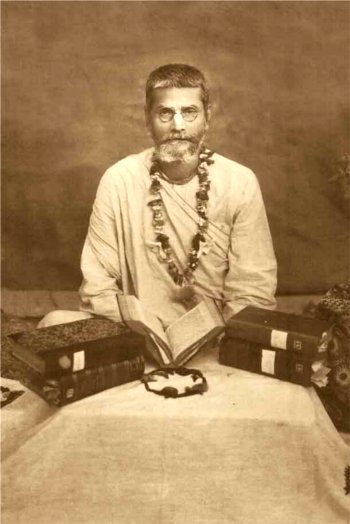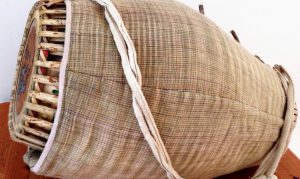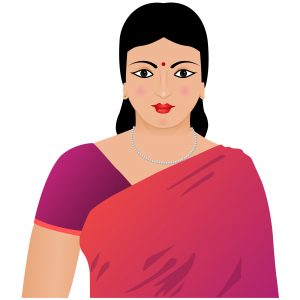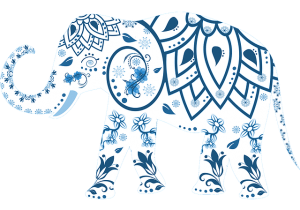
 Excerpt from a lecture given in Denpasar, Bali on February 25, 1997 by Śrīla Bhaktivedānta Nārāyaṇa Mahārāja (Editors’ input: Additional text from the book Ācārya Kesarī Śrī Śrīmad Bhakti Prajñāna Keśava Gosvāmī – His Life and Teachings, 2nd Edition has been included to facilitate the flow of content)
Excerpt from a lecture given in Denpasar, Bali on February 25, 1997 by Śrīla Bhaktivedānta Nārāyaṇa Mahārāja (Editors’ input: Additional text from the book Ācārya Kesarī Śrī Śrīmad Bhakti Prajñāna Keśava Gosvāmī – His Life and Teachings, 2nd Edition has been included to facilitate the flow of content)
The qualities we see in Nārada, we can also see in Vyāsa, Śukadeva Gosvāmī, Madhvācārya, then coming down in Mādhavendra Purī, Īśvara Purī, Svarūpa Dāmodara, Rāya Rāmānanda, Nityānanda Prabhu,  Advaita Ācārya and Gadādhara Paṇḍit. We can also see these qualities in Rūpa, Sanātana, Jīva, Kṛṣṇadāsa Kavirāja Gosvāmī, Narottama dāsa Ṭhākura, Viśvanātha Cakravartī Ṭhākura, Baladeva Vidyābhūṣaṇa, Śrīla Bhaktivinoda Ṭhākura, Jagannātha dāsa Bābājī Mahārāja, Gaura Kiśora dāsa Bābājī Mahārāja, Śrīla Prabhupāda, our Gurudeva, pūjyapāda Śrīdhara Mahārāja and Svāmījī — you can see these transcendental qualities in all our ācāryas.
Advaita Ācārya and Gadādhara Paṇḍit. We can also see these qualities in Rūpa, Sanātana, Jīva, Kṛṣṇadāsa Kavirāja Gosvāmī, Narottama dāsa Ṭhākura, Viśvanātha Cakravartī Ṭhākura, Baladeva Vidyābhūṣaṇa, Śrīla Bhaktivinoda Ṭhākura, Jagannātha dāsa Bābājī Mahārāja, Gaura Kiśora dāsa Bābājī Mahārāja, Śrīla Prabhupāda, our Gurudeva, pūjyapāda Śrīdhara Mahārāja and Svāmījī — you can see these transcendental qualities in all our ācāryas.
Svāmī Mahārāja preached throughout the whole world in just a few years. An ordinary person cannot do this. Now we will begin to describe the transcendental qualities of our Gurudeva.
My Gurudeva gave Sannyāsa to Bhaktivedānta Svāmī Mahārāja, who honoured him like a śikṣā and sannyāsa guru. Today we are offering praṇāma to the lotus feet of all our ācāryas.
A guru who has all these qualities will never fall down. If the guru falls down it is the greatest calamity that can befall a disciple. The disciple’s life becomes disturbed and he always struggles and suffers. He should pray to Kṛṣṇa, Mahāprabhu and Nityānanda Prabhu to arrange a guru who has all these qualities so that he will never have to struggle and suffer.
Today is our Gurudeva’s appearance day. When the bonafide gurus, the bonafide mahā-puruṣas, appear in this world they are endowed with auspicious signs. For example, when Śrīla Bhaktisiddhānta Sarasvatī took birth in the house of Śrīla Bhaktivinoda Ṭhākura in Purī the sign of the sacred thread was visible. There were also the signs of tilaka on twelve parts of the body and the signs of neck beads.
He was endowed at birth with extraordinary qualities. Our Guru Mahārāja also. Bhaktivedānta Svāmī Mahārāja took birth on Nandotsava, the day after Kṛṣṇa’s birth. As a child he used to cry if the  mṛdaṅga was not given to him and if anyone was not chanting Kṛṣṇa’s name he would cry, just like Mahāprabhu. He used to play, not with toys, but with Rādhā and Kṛṣṇa Deities and with mṛdaṅga and karatālas. His father was very invested in his son’s welfare and took good care of him.
mṛdaṅga was not given to him and if anyone was not chanting Kṛṣṇa’s name he would cry, just like Mahāprabhu. He used to play, not with toys, but with Rādhā and Kṛṣṇa Deities and with mṛdaṅga and karatālas. His father was very invested in his son’s welfare and took good care of him.
Our Guru Mahārāja was so attractive, all good qualities were in him. His mother was very serious and thoughtful and he took birth in a family of landholders. His mother was very strict and he became like his mother, not like his father, having her qualities. When he was a student, his mother instructed that he should come home early (before sunset). One day he came home at about nine o’clock at night. His mother was standing at the entrance waiting for him to come home. When he returned his mother took a stick and asked him why he was so late. He was silent and she angrily demanded him to tell her the reason otherwise she would beat him with the stick.
He told her that there was a reason. He said, “Some of us students have established a charitable organization that serves the destitute, helpless, poor and sick in a variety of ways. You give me money for snacks and I use it to help these people. We also go from house to house, begging food and clothing for them. Today a destitute, childless woman was suffering from cholera. After collecting money, we arranged for her to get medical treatment and a good diet. I have spent the whole day up until now doing this, and I haven’t even bathed or eaten. Now this old woman is beginning to recover. That is what I have been doing the whole day.” As soon as his mother heard this, the stick fell from her hands and her eyes filled with tears. Unable to utter a word, she embraced her son with both arms and promised that in the future she would never again try to discipline him.
He had enormous compassion, a quality that was evident at a very young age. He was always engaged in helping the devotees to attain Kṛṣṇa. The biggest problem in the world is that we have been thrown in the ocean of māyā and we are always suffering. The guru is the embodiment of the mercy of Kṛṣṇa. They are always concerned about our well-being.
He (Parama-gurudeva) used to sometimes be awake all night thinking about how to help the jīvas attain Kṛṣṇa. Although he was from a family of landholders, he used to work very hard for Kṛṣṇa and Caitanya Mahāprabhu, we cannot imagine this. I was serving him in the same way as Navīna serves me; I was very close to him, therefore I know him.
He had all the good qualities. When he was young, his father took him to temples, āśramas, religious assemblies and any place where discourses on Śrī Caitanya-caritāmṛta, Śrīmad-Bhāgavatam or the Gītā were being held.
He was the monitor of the class and captain of different sports. How did he join the maṭha?
One of his aunts was a disciple of Śrīla Prabhupāda, Bhaktisiddhānta Sarasvatī, who had vowed not to accept  any lady disciples. She was very qualified and she went to Śrīla Prabhupāda and asked, “Why will you only give initiation to males and not to females? What offence have these ladies made? Have they not been separated from Kṛṣṇa? Why are they not qualified to receive mercy?”
any lady disciples. She was very qualified and she went to Śrīla Prabhupāda and asked, “Why will you only give initiation to males and not to females? What offence have these ladies made? Have they not been separated from Kṛṣṇa? Why are they not qualified to receive mercy?”
Prabhupāda then replied, “I will give you initiation right now,” and he gave.
Śrīla Prabhupāda was not giving the guru-mantra to anyone, he used to only give the kṛṣṇa-mantra, the gaura-mantra and the kāma-gāyatrī, not everything. And for ladies, not the brahma-gāyatrī, only the gopāla-mantra was given. This is initiation. Caitanya Mahāprabhu also only received this, but after Rūpa Sanātana, in order to achieve the qualification the present system by which one receives initiation came into use.
Previously he was not giving the guru-mantra; our Guru Mahārāja met him in 1916 and the second initiation was done in 1919 at the time of Gaura-pūrṇimā in Māyāpura. Prabhupāda gave all the mantras but not the guru-mantra, aiṁ gurave namaḥ, and others. He asked, “Why Gurudeva, why are you not giving us the guru-mantra?”
“I don’t give the guru-mantra.” he replied.
“Must a disciple approach some other guru to receive the guru-mantra?”
Then Śrīla Prabhupāda became so pleased and he gave the guru-mantra and from then on he began to give everyone the guru-mantra.
Sometime around the year 1917 on Śrīla Prabhupāda’s instructions, Guru Mahārāja came from Māyāpura with a few disciples of Śrīla Prabhupāda to have the darśana of Śrīla Gaura Kiśora dāsa Bābājī Mahārāja. Śrīla Gaura Kiśora dāsa Bābājī Mahārāja was sitting in a latrine in Navadvīpa. In India the latrines are not like here or in other countries. The latrine is always full of stool and so many insects and worms are in it. It was very dirty and there was a bad odour too, but Śrīla Gaura Kiśora dāsa Bābājī Mahārāja was easily sitting there and chanting Hare Kṛṣṇa Hare Kṛṣṇa Kṛṣṇa Kṛṣṇa Hare Hare, with the door closed.
The district authorities, the police superintendent and other high officials came and repeatedly pleaded, “Bābājī Mahārāja, Bābājī Mahārāja, please open the door, we want to take darśana and we want to arrange a very good room for you, so please come out.”
He only replied in a feeble voice, “I am ill and not able to open the door,” but when they (Parama-gurudeva and others) arrived there, he quickly opened the door.
They said, “We are the servants of Śrīla Bhaktisiddhānta Sarasvatī Gosvāmī Ṭhākura, we are his disciples.”
He quickly opened the door and they went inside. You see, we want to invite the prime minister or any high official in our meetings, but they don’t want to. Everything will be disturbed, they will teach Māyāvāda philosophy. If  the prime minister comes, what will he do? He will teach Māyāvāda philosophy and other nonsense because he has never practised and he has no guru, but for name and fame we invite them and give them a patrikā, a magazine, “The rāṣṭrapati has come, the prime minister has come, this high official has come,” but they had nothing to do with them.
the prime minister comes, what will he do? He will teach Māyāvāda philosophy and other nonsense because he has never practised and he has no guru, but for name and fame we invite them and give them a patrikā, a magazine, “The rāṣṭrapati has come, the prime minister has come, this high official has come,” but they had nothing to do with them.
He gave his mercy to him and said, “I am taking all your miseries and sufferings on my head, be very bold and preach Kṛṣṇa consciousness to the whole world.”
So many troubles and problems came but our Guru Mahārāja was very bold and powerful, Svāmījī and Śrīla Bhaktisiddhānta Sarasvatī were also very bold, they would not accept any compromise, I will also not accept any compromise, the whole world can be opposed to me but I will continue to preach everywhere what our Gurudeva and disciplic succession have taught me. We don’t want karma, jñāna, yoga or tapasyā. We don’t want money, name, fame or anything else. We want pure bhakti. And in that pure bhakti, we want that rāgānuga bhakti for Sri Caitanya Mahaprabhu.
I will briefly describe how our Guru Mahārāja performed all kinds of service to his Gurudeva.
While attending college he used to teach the professors Caitanya-caritāmṛta. [After some time] He contemplated, “Why should I waste my time? I should serve my Gurudeva. What can they teach me?”
So he left college. There was an argument with them, they were teaching Māyāvāda philosophy and our Gurudeva completely refuted their arguments. He left college and went to Śrīla Bhaktisiddhānta Sarasvatī Ṭhākura and performed all kinds of service.
After three or four years his mother became very ill at home (about one thousand miles from Māyāpura in East Bengal).
His elder brother had also taken sannyāsa and his father had died, only three or four sons were there, and his mother was crying and she was getting ready to breathe her last breath.
She sent a letter to Śrīla Prabhupāda, she desperately wanted to see her son Vinoda-bihārī Brahmacārī in her last days. She beseeched him to send him to her quickly.
He called Vinoda Brahmacārī and told him, “Your mother is very ill, she may die soon, you should go pay her a visit.”
He returned from there and hid in his room chanting harināma and crying. It became night and Śrīla Prabhupāda asked his servant, “I told Vinoda to go to his mother. Did he go or not? You should find out.”
He told Śrīla Prabhupāda that Vinoda Brahmacārī had not left his room. Śrīla Prabhupāda called him the next day and said, “I instructed you to go to your mother, she is dying, why didn’t you go?”
He answered with folded hands, “Gurudeva, I know that she is not a liberated soul and if I go there during her last days and If on her deathbed she instructs me, ‘You should stay and take care of this home and support all these boys and take care of everything,’ then I would have to obey her last request and I would lose everything; I would not be able to serve you. By remembering me, it is you and Kṛṣṇa she is remembering and she will be liberated by this and if I go there, then I will lose your service and also my life because they will engage me in material activities and she will request me to marry and live as a householder.”
Then Prabhupāda began to cry and told him everything was fine and that he was a bonafide devotee. Do you understand this?
Prabhupāda’s disciples were also bonafide like him. He was so dedicated. Once there was a person, a devotee, who was always criticizing his godbrothers. He was of the opinion that only Prabhupāda was  a guru and there were no other bonafide devotees. So he used to criticize like this and he was the Maṭha commander. Śrīla Prabhupāda gave him this service. He continued to criticize. When Prabhupāda heard this, he told Vinoda Bihārī Brahmacārī, our Gurudeva, “Vinoda Bihārī, go at once and gather all the things of that Maṭha commander, put it on a bullock cart and expel him. He shouldn’t be in Māyāpura.”
a guru and there were no other bonafide devotees. So he used to criticize like this and he was the Maṭha commander. Śrīla Prabhupāda gave him this service. He continued to criticize. When Prabhupāda heard this, he told Vinoda Bihārī Brahmacārī, our Gurudeva, “Vinoda Bihārī, go at once and gather all the things of that Maṭha commander, put it on a bullock cart and expel him. He shouldn’t be in Māyāpura.”
He left and went somewhere else. After two hours Prabhupāda sent someone to find out if Vinoda had expelled that person. He went and saw that Vinoda Brahmacārī was sitting alone and chanting. When Prabhupāda was informed about this he said, “He will not expel this offender, I know him, he has a very soft heart.”
He told another person to go ahead and carry out his order and that servant immediately gathered his belongings and expelled him from the Maṭha.
The next day Prabhupāda called Vinoda Brahmacārī and asked him why he had not carried out his order. He replied, “I know that you are very merciful, if I will carry out this order then the next moment you may say, ‘Vinoda Brahmacārī, he is a fallen soul,’ and you may wish to reconsider. I know that you don’t take anyone’s offence, I know that the next moment you will call me and instruct me to bring that person back. So I was considering this.”
Then he (Śrīla Prabhupāda) became silent and began to think whether this person should be allowed to return to the Maṭha. However he saw that this person cannot change his mood and he had crossed the boundary of Vaiṣṇava aparādha. He did not allow him to return, but he was always concerned about his well-being.
We have heard all these things personally from our Gurudeva.
When Prabhupāda left this world, our Guru Mahārāja left the Gauḍīya Maṭha mission and he came to Calcutta and established the Gauḍīya Vedānta Samiti. At that council, Bhaktivedānta Svāmī was there. He was one of the founders of the Gauḍīya Vedānta Samiti and this Gauḍīya Vedānta Samiti was named after his name. The title of Svāmījī was Bhaktivedānta, so Guru Mahārāja preferred that this name should be adopted. The main subject of the Vedānta is bhakti and to preach this we will have to use this name. So this is how he established the Gauḍīya Vedānta Society. Also our names are Bhaktivedānta Nārāyaṇa, Bhaktivedānta Trivikrama, Bhaktivedānta Vāmana and Bhaktivedānta Svāmījī. I think that Bhaktivedānta Svāmī Mahārāja was the twenty-fourth sannyāsī (with the Bhaktivedānta title).
At that time so many prominent disciples of Prabhupāda were with Guru Mahārāja, but they had no money, not a single penny, so how to support everyone? There were more than twenty-five devotees. You don’t know the names but I do. Narahari Prabhu was there. He was not a sannyāsī, but all the sannyāsīs used to respect him and offer praṇāma to him. So many people were there.
One day Guru Mahārāja’s godbrother came to Calcutta to see our Gurudeva. It was Ekādaśī that day and he did not have a single penny. Guru Mahārāja wanted to offer his godbrother many sweets because he was so fond of sweets, but he had no money at all. There were so many Vaiṣṇavas who take aṇukalpa. Aṇukalpa is what we take on Ekādaśī (simple preparations made of fruits and roots, without grains), but nothing was arranged. He was sitting on the bed and chanting Hare Kṛṣṇa Hare Kṛṣṇa and thinking what to do. Actually I don’t know what he was thinking, but he told this story to everyone. On that day he instructed the devotees to observe Nirjala Ekādaśī, a complete fast, and everyone was happy to observe Nirjala Ekādaśī.
But what to do, his godbrother had come and he should be given sweets. Just then, he saw a bird, a very tiny bird, a sparrow. It was chirping and flying here and there  in the room and it had something wrapped in a torn cloth and it dropped from its beak a small packet, which clanged as it hit the ground very near to Gurudeva. Gurudeva took that cloth and was happy to find six-and-a-half annas there. One anna equals one-sixteenth of a rupee. He sent a person to the market, who then brought so many vegetables, jackfruit, and sweets. At that time it was very cheap in India. The devotee was honoured and given sweets and everything and after the cooking was done, the Vaiṣṇavas accepted aṇukalpa.
in the room and it had something wrapped in a torn cloth and it dropped from its beak a small packet, which clanged as it hit the ground very near to Gurudeva. Gurudeva took that cloth and was happy to find six-and-a-half annas there. One anna equals one-sixteenth of a rupee. He sent a person to the market, who then brought so many vegetables, jackfruit, and sweets. At that time it was very cheap in India. The devotee was honoured and given sweets and everything and after the cooking was done, the Vaiṣṇavas accepted aṇukalpa.
At that time, the postman came and called out, “Keśava Mahārāja, Keśava Mahārāja! You have received a money order from Rangoon. Pūjyapāda Giri Mahārāja has sent one hundred rupees.”
At that time one hundred rupees was equal to a hundred dollars. Guru Mahārāja began to cry because Kṛṣṇa had arranged all these things. Sincere Vaiṣṇavas who render full service to Kṛṣṇa with the body and senses will not starve and they will be protected by Kṛṣṇa Himself just like Ambarīṣa Mahārāja was protected by the cakra, and Prahlāda Mahārāja was protected from the very big demon Hiraṇyakaśipu. So Kṛṣṇa always saves and protects and nourishes.
So we have seen these things in our Gurudeva. There are so many things but it will take time.
Tomorrow I will speak so many things about Gurudeva, his relationship with Svāmījī, Prabhupāda, and Kṛṣṇa. His glories are the glories of Kṛṣṇa. His glories are the glories of his holy master. I am so fortunate to be the disciple of my Gurudeva. We are so fortunate to have a guru like him, a guru like Śrīla Bhaktisiddhānta Sarasvatī Ṭhākura.
You are also so fortunate that you are the disciples of Svāmījī, so fortunate to have a guru like him, it is very rare, so we are offering our puṣpāñjali at the lotus feet of our Gurudeva and the lotus feet of Śrīla Prabhupāda Śrīla Bhaktisiddhānta Sarasvatī Ṭhākura and my śikṣā-guru also. I am also offering my heartfelt puṣpāñjali to the lotus feet of pūjyapāda Śrīdhara Mahārāja and pūjyapāda Purī Mahārāja.
By hearing their life history we can gain so much, so try to adopt all these things, how to serve the Divine Master and how to serve Kṛṣṇa.
Before I conclude my lecture there is one more very important thing. Śrīla Bhaktisiddhānta Sarasvatī Ṭhākura wanted to give him sannyāsa and three times everything was ready. The daṇḍa was ready, the red cloth was ready, the name was selected, everything was ready, but the secretary objected that if he were to be given sannyāsa, it would jeopardize the protection of the Gauḍīya Maṭha and mission. So he requested Śrīla Prabhupāda not to give him sannyāsa, and that he should be like a manager, secretary, and handle all the matters of all the Maṭhas. At that time nobody else could expertly handle all these matters. Śrīla Prabhupāda never received a complaint, all complaints and so on used to come to him and he used to manage everything, even court cases and so on. So Śrīla Prabhupāda said, “I want to give, but they are objecting.” Three times it was thus prepared.
When Prabhupāda disappeared, Guru Mahārāja had a dream of Śrīla Prabhupāda saying, “Vinoda, because you have not taken sannyāsa yet, my entire preaching work is being ruined. My parikramā has stopped, giving sannyāsa has stopped, my magazines and journals have also stopped, all book publication has stopped, you should take sannyāsa at once.” Then Guru Mahārāja decided to take sannyāsa.
When Prabhupāda was here in this world, he established who is a brāhmaṇa and the real brāhmaṇa religion and what is pure devotion, love and affection and bhakti. All the (so-called) learned persons of Navadvīpa became antagonistic to him. Śrīla Prabhupāda was preaching that the son of a brāhmaṇa is not automatically a brāhmaṇa. Only if he has the qualities of a brāhmaṇa is he then a brāhmaṇa. He gave the evidence from the Gītā śloka, cātur-varṇyaṁ mayā sṛṣṭaṁ — anyone can be a brāhmaṇa by taking initiation and serving Kṛṣṇa. They all became inflamed and wanted to kill Śrīla Prabhupāda.
One year thousands of devoted pilgrims performed parikramā in an enormous saṅkīrtana party. He came with many devotees to Navadvīpa, and Ṭhākurajī was riding on the back of an elephant, and all were doing kīrtana with mṛdaṅga, and dancing and singing. When they arrived in the middle of the  town, they attacked them with soda bottles, hot water, bricks, stones and the violent mob was searching for him in order to kill him. At that time all ran here and there to protect their lives, the elephant fled from there and all the disciples were scattered here and there. However our Gurudeva, Vinoda Bihārī Brahmacārī, immediately took Śrīla Prabhupāda to the room of a devotee’s house nearby for protection. There, he quickly put on Śrīla Prabhupāda’s sannyāsa dress and took his daṇḍa, giving his own white clothes to Śrīla Prabhupāda to wear! Somehow he sent Śrīla Prabhupāda, undetected, to Māyāpura, in this ordinary dress while he stayed there. Meanwhile, the police arrived. Sometime later, he reached Māyāpura safely, still dressed as a sannyāsī.
town, they attacked them with soda bottles, hot water, bricks, stones and the violent mob was searching for him in order to kill him. At that time all ran here and there to protect their lives, the elephant fled from there and all the disciples were scattered here and there. However our Gurudeva, Vinoda Bihārī Brahmacārī, immediately took Śrīla Prabhupāda to the room of a devotee’s house nearby for protection. There, he quickly put on Śrīla Prabhupāda’s sannyāsa dress and took his daṇḍa, giving his own white clothes to Śrīla Prabhupāda to wear! Somehow he sent Śrīla Prabhupāda, undetected, to Māyāpura, in this ordinary dress while he stayed there. Meanwhile, the police arrived. Sometime later, he reached Māyāpura safely, still dressed as a sannyāsī.
Prabhupāda gave him his daṇḍa and his own cloth, his sannyāsī veṣa, what else remains? We think that at that time he gave him sannyāsa. After that he took sannyāsa in Kaṭvā Nagara, where Caitanya Mahāprabhu had taken sannyāsa from Keśava Bhāratī. Previously in a dream Prabhupāda had awarded him sannyāsa and had given him the name Bhakti Prajñāna Keśava Mahārāja. Śrīla Śrīdhara Mahārāja confirmed that it was a proper name.
[Gaura-premānande Hari Haribol!]
Image/Art made possible by Pixabay.com & Krishnapath.org








